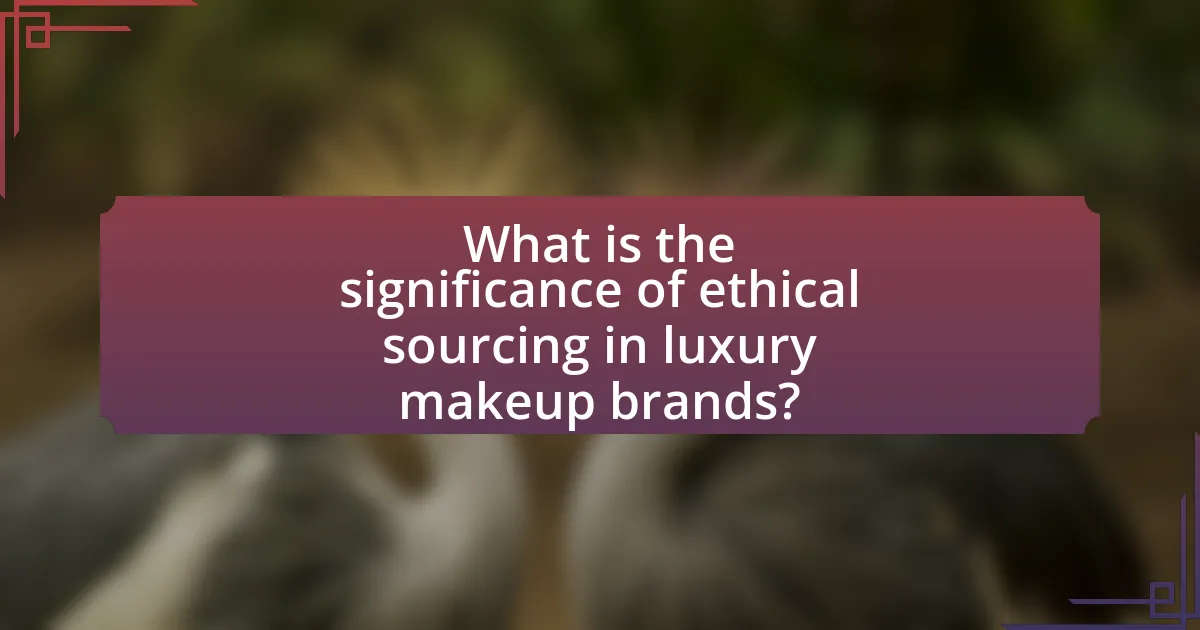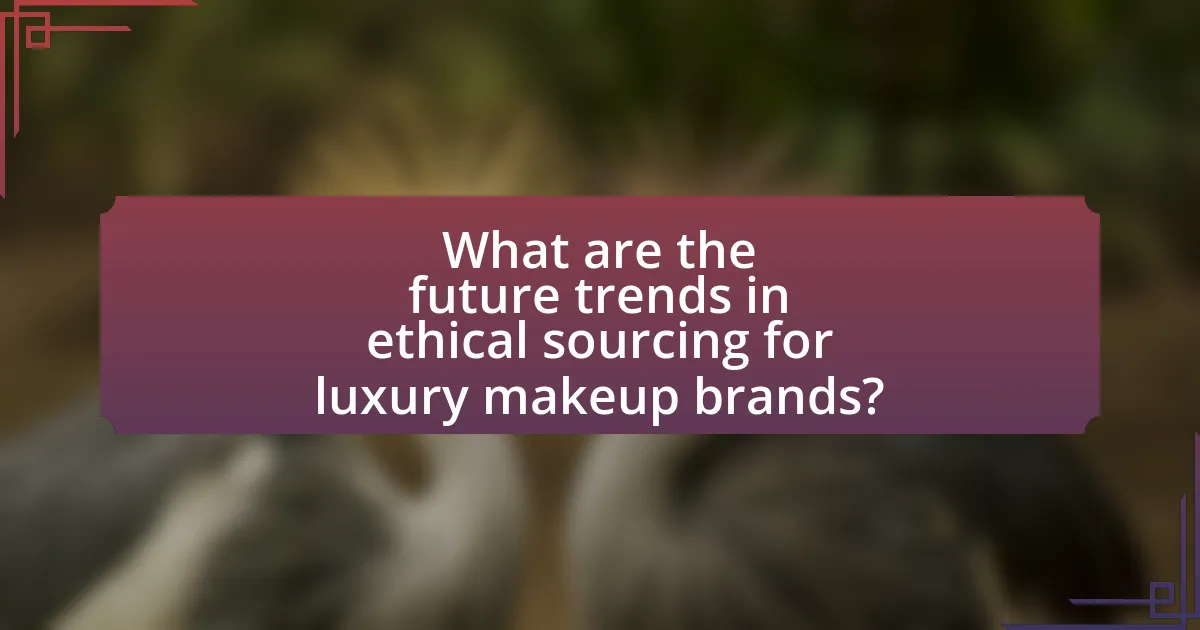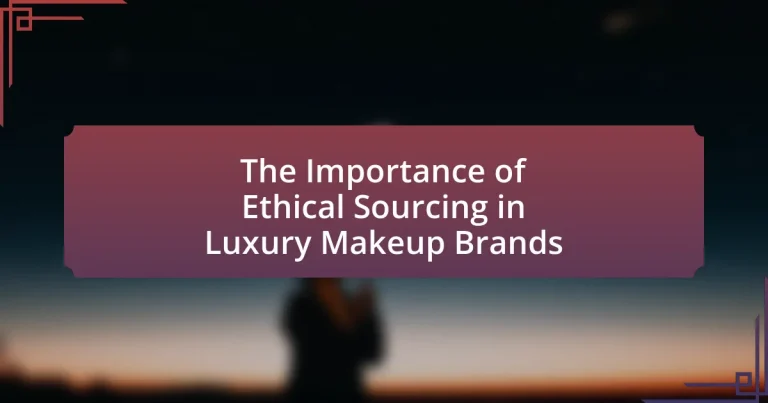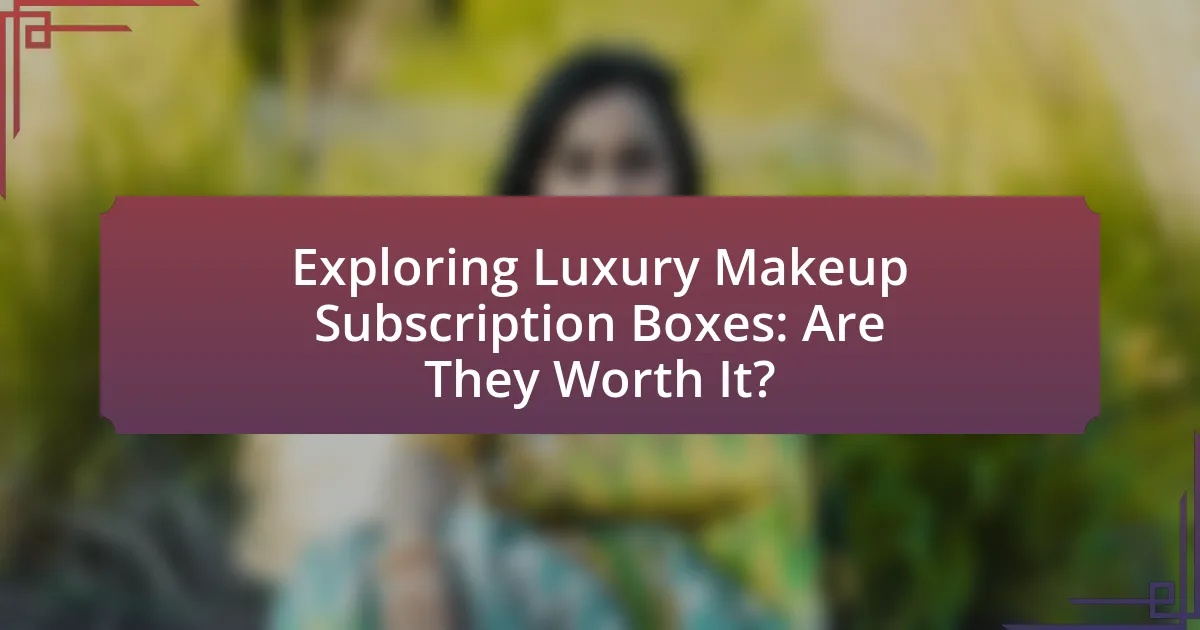The article focuses on the significance of ethical sourcing in luxury makeup brands, highlighting its impact on brand reputation and consumer trust. It outlines the growing consumer demand for sustainability and transparency, with statistics indicating that a majority of consumers prioritize ethical considerations in their purchasing decisions. Key principles of ethical sourcing, such as sustainability, fair labor practices, and cruelty-free standards, are discussed, along with the challenges luxury brands face in implementing these practices. The article also examines the role of regulations, technology, and innovative strategies in enhancing ethical sourcing efforts, ultimately emphasizing the benefits of ethical sourcing for brand differentiation and customer loyalty.

What is the significance of ethical sourcing in luxury makeup brands?
Ethical sourcing is significant in luxury makeup brands as it enhances brand reputation and consumer trust. Luxury makeup brands that prioritize ethical sourcing demonstrate a commitment to sustainability and social responsibility, which resonates with increasingly conscious consumers. For instance, a 2021 survey by McKinsey & Company found that 67% of consumers consider sustainability when making luxury purchases. This shift in consumer behavior underscores the importance of ethical sourcing as a competitive advantage in the luxury market. Furthermore, ethical sourcing practices can lead to higher quality ingredients, as they often involve more stringent standards for production and sourcing, ultimately benefiting both the brand and the consumer.
Why is ethical sourcing becoming a priority for consumers?
Ethical sourcing is becoming a priority for consumers due to increasing awareness of social and environmental issues associated with production practices. Consumers are now more informed about the impact of their purchasing decisions, leading to a demand for transparency and accountability from brands. According to a 2021 survey by Nielsen, 73% of global consumers are willing to change their consumption habits to reduce environmental impact, highlighting the shift towards ethical considerations in buying behavior. This trend is particularly pronounced in luxury makeup brands, where consumers expect not only high-quality products but also responsible sourcing of ingredients and materials.
What are the key principles of ethical sourcing in the beauty industry?
The key principles of ethical sourcing in the beauty industry include sustainability, transparency, fair labor practices, and cruelty-free standards. Sustainability focuses on sourcing ingredients that do not deplete natural resources or harm ecosystems, ensuring that products are environmentally friendly. Transparency involves clear communication about ingredient origins and sourcing practices, allowing consumers to make informed choices. Fair labor practices ensure that workers involved in the production process receive fair wages and work in safe conditions, promoting social responsibility. Cruelty-free standards guarantee that no animal testing is conducted during product development, aligning with ethical consumer values. These principles are essential for luxury makeup brands aiming to build trust and loyalty among consumers who prioritize ethical considerations in their purchasing decisions.
How does consumer awareness impact luxury makeup brands’ sourcing practices?
Consumer awareness significantly influences luxury makeup brands’ sourcing practices by driving demand for ethically sourced ingredients. As consumers become more informed about issues such as sustainability, animal welfare, and fair trade, luxury brands are compelled to adopt transparent and responsible sourcing strategies to meet these expectations. For instance, a 2021 survey by McKinsey found that 67% of consumers consider sustainability when making luxury purchases, prompting brands to prioritize eco-friendly materials and ethical labor practices. This shift not only enhances brand reputation but also aligns with the growing market trend towards conscious consumerism, ultimately leading to more sustainable sourcing practices in the luxury makeup industry.
What challenges do luxury makeup brands face in ethical sourcing?
Luxury makeup brands face significant challenges in ethical sourcing, primarily due to the complexity of supply chains and the need for transparency. These brands often source ingredients from multiple suppliers across different regions, making it difficult to ensure that all materials are ethically obtained and free from exploitation. For instance, sourcing natural ingredients like mica can involve child labor in certain countries, which poses a moral dilemma for brands committed to ethical practices. Additionally, the lack of standardized regulations and certifications in the beauty industry complicates the verification of ethical sourcing claims, leading to potential greenwashing. According to a 2021 report by the Ethical Consumer, 60% of consumers are concerned about the ethical implications of their purchases, pressuring luxury brands to adopt more responsible sourcing practices while navigating these challenges.
How do supply chain complexities affect ethical sourcing efforts?
Supply chain complexities significantly hinder ethical sourcing efforts by creating challenges in transparency and traceability. These complexities arise from multiple tiers of suppliers, geographic dispersion, and varying regulatory environments, making it difficult for luxury makeup brands to ensure that their raw materials are sourced responsibly. For instance, a study by the World Economic Forum highlights that 70% of companies struggle to trace their supply chains beyond the first tier, which can lead to unintentional support of unethical practices such as child labor or environmental degradation. Consequently, without clear visibility into the supply chain, luxury makeup brands face increased risks of reputational damage and consumer distrust, ultimately undermining their commitment to ethical sourcing.
What role do regulations play in ethical sourcing for luxury brands?
Regulations play a critical role in ethical sourcing for luxury brands by establishing standards that ensure transparency, sustainability, and fair labor practices. These regulations, such as the Modern Slavery Act and the EU’s Conflict Minerals Regulation, require brands to disclose their supply chain practices and verify that their sourcing does not contribute to human rights abuses or environmental degradation. Compliance with these regulations not only helps luxury brands maintain their reputation but also fosters consumer trust, as evidenced by a 2021 survey indicating that 66% of consumers are willing to pay more for sustainable brands.

How does ethical sourcing influence brand reputation in the luxury makeup market?
Ethical sourcing significantly enhances brand reputation in the luxury makeup market by aligning with consumer values and promoting sustainability. Brands that prioritize ethical sourcing demonstrate a commitment to social responsibility, which resonates with increasingly conscious consumers. For instance, a 2021 survey by McKinsey found that 67% of consumers consider sustainability when making luxury purchases, indicating that ethical practices can directly influence purchasing decisions. Furthermore, luxury brands like L’Oréal and Estée Lauder have reported improved customer loyalty and brand perception after implementing ethical sourcing initiatives, showcasing the tangible benefits of such practices on reputation.
What are the benefits of ethical sourcing for luxury makeup brands?
Ethical sourcing provides luxury makeup brands with enhanced brand reputation, consumer trust, and competitive advantage. By ensuring that ingredients are sourced responsibly, these brands can appeal to a growing demographic of socially conscious consumers who prioritize sustainability and ethical practices. Research indicates that 66% of global consumers are willing to pay more for sustainable brands, demonstrating a clear market demand for ethically sourced products. Additionally, ethical sourcing can lead to improved supply chain transparency, reducing risks associated with labor violations and environmental damage, which further strengthens brand loyalty and customer retention.
How does ethical sourcing enhance customer loyalty and trust?
Ethical sourcing enhances customer loyalty and trust by demonstrating a brand’s commitment to social responsibility and sustainability. When luxury makeup brands prioritize ethical sourcing, they ensure that their products are made from materials that are obtained in a manner that respects human rights and the environment. This transparency fosters a sense of integrity and reliability among consumers. According to a 2021 study by Nielsen, 66% of global consumers are willing to pay more for sustainable brands, indicating that ethical practices resonate with customers and influence their purchasing decisions. As a result, brands that engage in ethical sourcing not only attract a loyal customer base but also build long-term trust, as consumers feel aligned with the brand’s values and mission.
What impact does ethical sourcing have on brand differentiation?
Ethical sourcing significantly enhances brand differentiation by aligning a brand’s values with consumer expectations for sustainability and social responsibility. Luxury makeup brands that prioritize ethical sourcing often attract a more conscious consumer base, as studies indicate that 66% of global consumers are willing to pay more for sustainable brands. This commitment to ethical practices not only fosters customer loyalty but also sets the brand apart in a competitive market, as consumers increasingly seek transparency and accountability in their purchasing decisions. Brands like Lush and Aveda exemplify this impact, as they have successfully integrated ethical sourcing into their core identity, leading to increased market share and positive brand perception.
How can luxury makeup brands effectively communicate their ethical sourcing practices?
Luxury makeup brands can effectively communicate their ethical sourcing practices by utilizing transparent storytelling and engaging digital platforms. By sharing detailed narratives about their sourcing processes, including the origins of ingredients and partnerships with ethical suppliers, brands can build trust with consumers. For instance, brands like L’Oréal and Estée Lauder have implemented sustainability reports that outline their sourcing strategies and ethical commitments, demonstrating accountability. Additionally, leveraging social media and influencer collaborations can amplify these messages, reaching a broader audience and fostering community engagement around ethical practices.
What strategies can brands use to educate consumers about their sourcing efforts?
Brands can educate consumers about their sourcing efforts through transparency initiatives, storytelling, and engaging digital content. Transparency initiatives involve providing detailed information about the origins of ingredients, production processes, and labor practices, often through labeling or dedicated sections on websites. Storytelling can be employed to share the narratives behind sourcing decisions, highlighting the impact on communities and the environment, which resonates with consumers’ values. Engaging digital content, such as videos, infographics, and social media campaigns, can effectively communicate these messages, making complex information accessible and relatable. For instance, a study by Nielsen found that 66% of global consumers are willing to pay more for sustainable brands, indicating that effective education on sourcing can influence purchasing decisions.
How can transparency in sourcing build brand credibility?
Transparency in sourcing builds brand credibility by fostering trust and authenticity among consumers. When luxury makeup brands openly share information about their sourcing practices, including ingredient origins and production processes, they demonstrate a commitment to ethical standards. This transparency allows consumers to make informed choices, aligning their values with the brand’s practices. Research indicates that 73% of consumers are willing to pay more for products from brands that are transparent about their sourcing (Label Insight, 2016). By providing clear and accessible information, brands can enhance their reputation, attract loyal customers, and differentiate themselves in a competitive market.

What are the future trends in ethical sourcing for luxury makeup brands?
Future trends in ethical sourcing for luxury makeup brands include increased transparency in supply chains, a focus on sustainable ingredients, and the adoption of circular economy practices. Luxury brands are prioritizing transparency by publicly disclosing sourcing practices and ingredient origins, which builds consumer trust. Additionally, there is a growing emphasis on sourcing sustainable and ethically produced ingredients, such as plant-based materials and responsibly harvested minerals, to minimize environmental impact. Circular economy practices, such as recycling and upcycling packaging, are also becoming integral to brand strategies, aligning with consumer demand for sustainability. These trends are supported by consumer research indicating that 73% of millennials are willing to pay more for sustainable products, highlighting the market shift towards ethical sourcing in the luxury makeup sector.
How is technology shaping ethical sourcing in the beauty industry?
Technology is significantly shaping ethical sourcing in the beauty industry by enhancing transparency and traceability in supply chains. Advanced technologies such as blockchain enable brands to track the origin of ingredients, ensuring they are sourced sustainably and ethically. For instance, companies like L’Oréal have implemented blockchain to verify the sourcing of raw materials, allowing consumers to access detailed information about the product’s journey from source to shelf. This level of transparency not only builds consumer trust but also holds suppliers accountable for ethical practices, thereby promoting sustainability within the industry.
What innovations are emerging to improve ethical sourcing practices?
Innovations emerging to improve ethical sourcing practices include blockchain technology, which enhances transparency in supply chains by providing immutable records of sourcing and production processes. Companies like Everledger utilize blockchain to trace the origin of raw materials, ensuring they are sourced responsibly. Additionally, artificial intelligence is being employed to analyze supplier practices and assess compliance with ethical standards, as seen in platforms like Sourcemap. These technologies not only promote accountability but also empower consumers to make informed choices about the products they purchase, thereby fostering a more ethical marketplace.
How can luxury brands leverage sustainability trends in their sourcing strategies?
Luxury brands can leverage sustainability trends in their sourcing strategies by integrating eco-friendly materials and ethical practices into their supply chains. This approach not only meets consumer demand for sustainable products but also enhances brand reputation and loyalty. For instance, a report by McKinsey & Company indicates that 67% of consumers consider sustainability when making a purchase, highlighting the market potential for brands that prioritize ethical sourcing. By sourcing organic ingredients, utilizing recycled packaging, and ensuring fair labor practices, luxury brands can align their operations with sustainability trends, ultimately driving both profitability and positive environmental impact.
What practical steps can luxury makeup brands take to enhance their ethical sourcing?
Luxury makeup brands can enhance their ethical sourcing by implementing transparent supply chain practices. This involves conducting thorough audits of suppliers to ensure compliance with ethical standards, such as fair labor practices and environmentally sustainable sourcing. For instance, brands can adopt certifications like Fair Trade or Rainforest Alliance, which provide third-party validation of ethical practices. Additionally, luxury brands can invest in direct partnerships with local communities to source ingredients, ensuring that the economic benefits are shared and that traditional practices are respected. According to a 2021 report by McKinsey & Company, brands that prioritize ethical sourcing not only improve their brand reputation but also attract a growing consumer base that values sustainability, with 67% of consumers willing to pay more for sustainable products.
How can brands establish partnerships with ethical suppliers?
Brands can establish partnerships with ethical suppliers by conducting thorough research to identify suppliers that adhere to ethical standards in labor practices, environmental sustainability, and fair trade. This involves evaluating certifications such as Fair Trade, Rainforest Alliance, or B Corp, which provide evidence of a supplier’s commitment to ethical practices. Additionally, brands should engage in direct communication with potential suppliers to assess their values and practices, ensuring alignment with the brand’s ethical sourcing goals. Collaborating with organizations that specialize in ethical sourcing can also facilitate connections with reputable suppliers. According to a 2021 report by the Ethical Trading Initiative, brands that prioritize ethical sourcing not only enhance their reputation but also contribute to sustainable development, demonstrating the tangible benefits of such partnerships.
What best practices should brands adopt for continuous improvement in sourcing ethics?
Brands should adopt transparency, supplier audits, and stakeholder engagement as best practices for continuous improvement in sourcing ethics. Transparency involves openly sharing sourcing practices and supply chain information, which builds trust and accountability. Regular supplier audits ensure compliance with ethical standards, allowing brands to identify and address potential issues in their supply chains. Engaging stakeholders, including consumers and advocacy groups, fosters collaboration and encourages feedback, leading to more informed and ethical sourcing decisions. These practices are supported by studies indicating that brands with transparent supply chains and active stakeholder engagement see improved consumer trust and loyalty, ultimately enhancing their market position.




